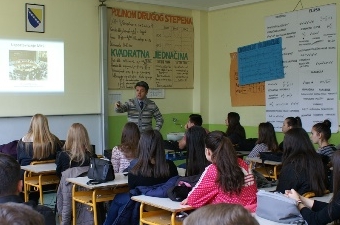The ICTY representative in Bosnia and Herzegovina (“BiH”), Almir Alić, travelled today to the town of Fojnica in central BiH to meet with students from Zija Dizdarević high school. Despite the conflict during the 1990s, this small community has managed to preserve its multi-ethnic character. Today, Fojnica marked 100 years since the birth of Zija Dizdarević, a Bosnian writer who was killed during the Second World War in the Jasenovac concentration camp. The secondary mixed school named after him welcomed the ICTY representative at the initiative of the school management and teaching staff, who recognise the importance of including younger generations in the process of facing the past.
Mr. Alić spoke to a group of more than 40 final year students about the work of the Tribunal and its contribution to justice, both in the former Yugoslavia and more broadly. He explained the Tribunal’s mission and achievements and introduced students to its rich legacy, including its significance for the development of international law.
The students were curious and wanted to know more about different aspects of the Tribunal’s work. In particular, they were interested in the composition of the Tribunal’s chambers and the process through which a chamber reaches its judgement. Other questions related to the principles of “command responsibility”, and Mr. Alić explained the circumstances in which superiors could be held responsible for the actions of their subordinates.
Through their questions and comments, the students from Fojnica showed maturity in reflecting on the issues of post-conflict recovery and reconciliation. One 18 year-old student expressed his faith in reconciliation in the region of the former Yugoslavia through “communication and open dialogue”. His classmate underlined the importance of the ICTY Outreach Programme's work with young people, pointing out that “such presentations should raise awareness about the importance of being objective about the past events”.


